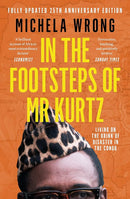Description
He was known as "the Leopard," and for the thirty-two years of his reign Mobutu Sese Seko, president of Zaire, showed all the cunning of his namesake, seducing Western powers, buying up the opposition, and dominating his people with a devastating combination of brutality and charm. While the population was pauperized, he plundered the country's copper and diamond resources, downing pink champagne in his jungle palace like some modern-day reincarnation of Joseph Conrad's crazed station manager.
Michela Wrong, a correspondent who witnessed firsthand Mobutu's last days, traces the rise and fall of the idealistic young journalist who became the stereotype of an African despot. Engrossing, highly readable, and as funny as it is tragic, her book assesses how Belgium's King Leopold, the CIA, and the World Bank all helped to bring about the disaster that is now the Democratic Republic of Congo. If, in this poignant account, the villains are the "Big Vegetables" (les Grosses légumes) — the fat cats who benefited from Mobutu's largesse — the heroes are the ordinary citizens trapped in a parody of a state. Living in the shadow of a disintegrating nuclear reactor, where banknotes are not worth the paper they are printed on, they have turned survival into an art form. For all its valuable insights into Africa's colonial heritage and the damage done by Western intervention, In the Footsteps of Mr. Kurtz is ultimately a celebration of the irrepressible human spirit
Michela Wrong, a correspondent who witnessed firsthand Mobutu's last days, traces the rise and fall of the idealistic young journalist who became the stereotype of an African despot. Engrossing, highly readable, and as funny as it is tragic, her book assesses how Belgium's King Leopold, the CIA, and the World Bank all helped to bring about the disaster that is now the Democratic Republic of Congo. If, in this poignant account, the villains are the "Big Vegetables" (les Grosses légumes) — the fat cats who benefited from Mobutu's largesse — the heroes are the ordinary citizens trapped in a parody of a state. Living in the shadow of a disintegrating nuclear reactor, where banknotes are not worth the paper they are printed on, they have turned survival into an art form. For all its valuable insights into Africa's colonial heritage and the damage done by Western intervention, In the Footsteps of Mr. Kurtz is ultimately a celebration of the irrepressible human spirit


